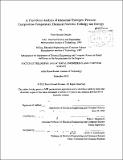A theoretical analysis of interstitial hydrogen : pressure-composition-temperature, chemical potential, enthalpy and entropy
Author(s)
Orondo, Peter Omondi
DownloadFull printable version (78.97Mb)
Other Contributors
Massachusetts Institute of Technology. Department of Electrical Engineering and Computer Science.
Advisor
Peter L. Hagelstein.
Terms of use
Metadata
Show full item recordAbstract
We provide a first principles analysis of the physics and thermodynamics of interstitial hydrogen in metal. By utilizing recent advances in Density Functional Theory (DFT) to get state energies of the metal-hydrogen system, we are able to model the absorption process fairly accurately. A connection to experiment is made via Pressure-Composition-Temperature (PCT) isotherms, and thermodynamic molar quantities. In the model, we understand the excess entropy of absorbed hydrogen in terms of the change in its accessible microstates. A connection is also made between the entropy and electronic states of interstitial hydrogen. However, our model indicates that this connection is too small to account for experimental results. Therefore, a conclusion is made that the entropy of absorbed hydrogen is mostly (non-ideal) configurational in nature. To model the latter in a manner consistent with experiment, we have explored a new model that posits a weak binding between clusters of hydrogen atoms at neighboring sites. We have developed a formulation and fitted the results to experimental data. We find a least squares fitting of the model to the entropy and enthalpy results in model parameters which seem physically reasonable. The resulting model appears to provide a natural physical explanation for the dependence of the excess entropy on loading.
Description
Thesis (Ph. D.)--Massachusetts Institute of Technology, Dept. of Electrical Engineering and Computer Science, 2012. Cataloged from PDF version of thesis. Includes bibliographical references (p. 371-373).
Date issued
2012Department
Massachusetts Institute of Technology. Department of Electrical Engineering and Computer SciencePublisher
Massachusetts Institute of Technology
Keywords
Electrical Engineering and Computer Science.